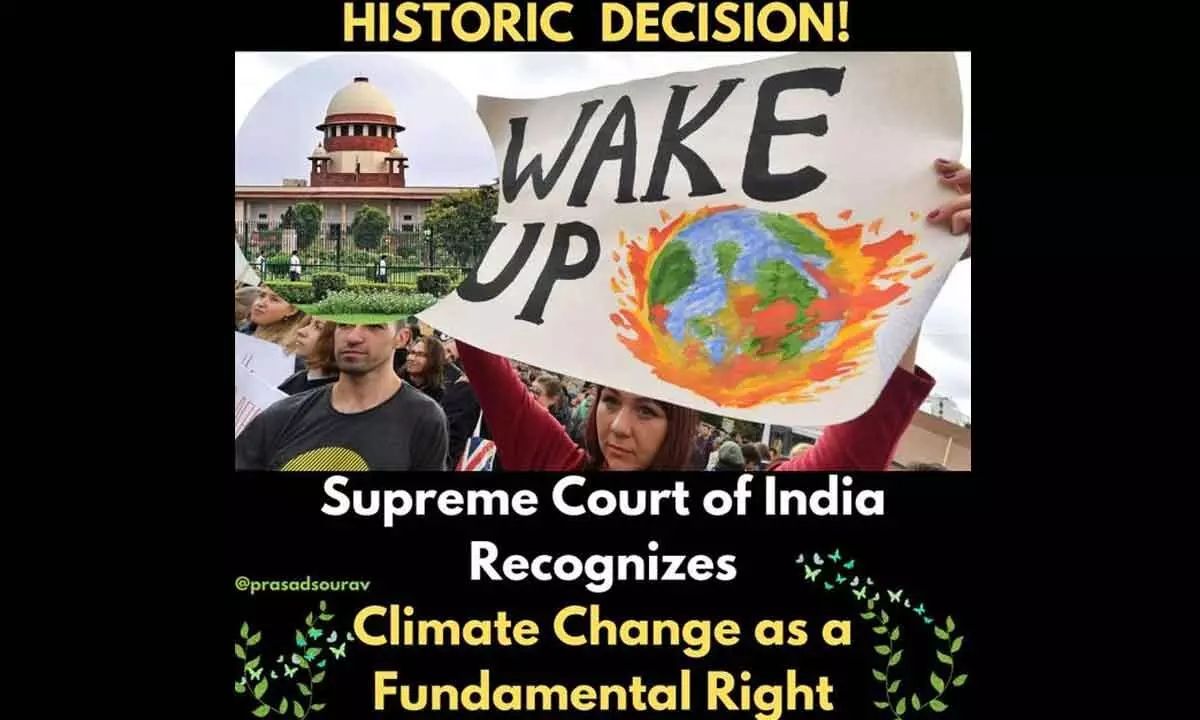Two recent landmark judgements on climate change are timely wake up calls
Unseasonal or deficient rainfall, storms, heat waves, and other climate related hazards are becoming more frequent
image for illustrative purpose

We cannot afford to only talk without any practical implementation. It is in the interest of every country, particularly developed nations, to initiate bolder climate action at home and abroad, including on climate finance. A way out is that G7 and G20 need to rise to the occasion
The global concerns on climate change which affects the environment are also getting the attention of courts because it impacts human lives, especially children, and livestock particularly in the areas of health, food and shelter.
Climate change is changing water availability, which has adversely hit agriculture production because it affects crops. The entire world is reeling such warming as it is also leading to health issues apart from problems related to shelter and water. Unseasonal or deficient rainfall, storms, heat waves, and other climate related hazards are becoming more intense and more frequent.
These risks have already reached critical levels and they may turn catastrophic if urgent and decisive measures are not taken up on a priority basis. There should be a mutually agreed upon action plan for adaptation and mitigation like reducing dependence on fossil fuels for energy. There is a need to tap alternative clean energy sources like solar, wind and hydrogen to significantly reduce incremental emissions.
The required assistance and aid to low income and less developed countries has to flow on a greater scale as the risks are higher for them; their abilities to invest have to be strengthened without which such disasters and losses will be frequent and they may not able to survive the onslaught.
In his address at Chatham House on April 10, Simon Stiel mentioned that “world will have maximum two years to save the world”.
In view of the climate risks already becoming a reality, it is imperative that the desired action plans must be implemented without any further delay. There is a need to extend climate finance with a quantum leap this year, which is both essential and entirely achievable. We have to ensure more concessional finance, especially for the poorest and most vulnerable countries. New sources of climate finance are to be found out and a good thing is that G20, International Maritime Organization and other such entities are working on them.
The proposed reforms of developmental banks are to be expedited so that developing countries can benefit and build a financial system for the twenty first century. Banks have to go in for debt restructuring and extend debt relief to countries which need it most so that they get fiscal space for climate investment. He reiterated the closer cooperation between international institutions is the need of the hour.
We cannot afford to only talk without any practical implementation. It is in the interest of every country, particularly developed nations, to initiate bolder climate action at home and abroad, including on climate finance. A way out is that G7 and G20 need to rise to the occasion. The higher investments on clean energy with new capacities should also have parallel reductions in use of fossil fuels.
Coming to Stiel’s opinion of two years to save the world, what needs to be clarified is who exactly has two years to save the world. The answer, incidentally, comes from him "Every person living on this planet."
It is apt because every individual has the responsibility to ensure that he does not further harm the environment and the ecosystems and would rather facilitate in reducing the risks of climate change substantially.
Coming to the involvement of courts, the Supreme Court on April 6 expanded the scope of fundamental rights to include "the right to be free from adverse effects of climate change".
This is indicative of the serious threat that climate change poses to the lives and welfare of people. This landmark judgement will have greater impact as there is now legal accountability of the actions that undermine climate change.
According to experts, this judgement on the ‘M K Ranjitsinh & IRS vs Union of India and others’, significantly influences jurisprudence on climate governance in India. All stakeholders will have to be mindful of the effect on environment when taking up any developmental projects.
In a major verdict by the European court as regards human rights, the Strasbourg's Court's Swiss climate ruling around the vulnerability of older women to heat waves marks a significant shift and can have global impact, say experts. The court ruled that Switzerland's failure to do enough to cut its national greenhouse gas emissions was a clear violation of the human rights of a group of more than 2000 older Swiss women. It was the first time the Court, which is responsible for interpreting the European convention on human rights, a treaty signed by all members of the council of Europe, had ruled a climate change related matters. This ruling has recognised the right of citizens to make claims on adverse impacts of climate change and the State is responsible for minimum governance standards that states should have " due regard" to such as setting carbon budgets and Interim targets, keeping those updated and based on the best available evidence, and being transparent about how well they are being met"
These rulings are the best demonstration of the importance of adequate care and adaptation and mitigation plans to achieve the zero emissions target by each country as any adverse impact on human lives and the environment could lead to such litigation, and pose a threat to human survival.
At the cost of repetition, the responsibility to protect, preserve and maintain environment ecosystem in full balance is every citizen’s responsibility. The onus is on them to ensure a healthier atmosphere for the current and future generations.
(The author is former Chairman & Managing Director of Indian Overseas Bank)

